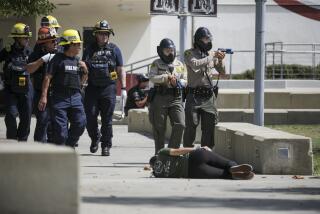Theme Park Checks OKd by Assembly
- Share via
On the second anniversary of a teenager’s death at a Bay Area water park, the state Assembly voted overwhelmingly Wednesday to regulate permanent theme parks.
The bipartisan vote was 60 to 15.
The bill by Assemblyman Tom Torlakson (D-Antioch), which now moves to the Senate for consideration, is a compromise measure. Calling for state inspections of amusement-park rides once every
four years plus public reporting of serious injuries and annual reviews of park records, it is weaker than a shelved parallel bill that would have required inspections twice a year. But the bill is also stronger than early suggestions from the industry that regulations be limited to parks inspecting their own rides and filing affidavits with the state.
The bill also requires parks to carry insurance, sets standards for ride inspectors and has a rider responsibility code. Parks would be required to provide proof of annual inspections, whether by staff engineers or other qualified inspectors.
“Bring California into the next century with this common-sense protection measure,” Torlakson said in urging Assembly members to support his bill. California is one of 12 states nationwide that does not regulate rides at permanent amusement parks.
Torlakson’s first attempt at regulating rides, which failed in committee last year, was prompted by the death of a high school senior from Napa at Waterworld USA in his district. A water slide collapsed, killing Quimby Ghilotti and injuring 32 others.
Torlakson took up the issue again this year after a fatal Christmas Eve accident at Disneyland. A metal mooring cleat that tore loose from the Columbia sailing ship flew into a crowd of tourists, killing a Washington state man and seriously injuring his wife and a park worker.
Republican Assembly members who spoke in favor of the bill were persuaded of its merits after hearing committee testimony from two mothers whose children were maimed or killed at theme parks.
Kathy Fackler of La Jolla, an outspoken proponent of regulation, said her son lost the toes on one foot after the foot got stuck on the Big Thunder Mountain ride at Disneyland in 1998, when he was 5.
Victoria Nelson spent Wednesday, the second anniversary of her daughter’s death, pushing for the bill, which she sees as sparing other parents the same grief.
Clutching snapshots of her daughter Quimby, who died at age 18, and a spray of pink tulips for Torlakson, Nelson said, “I lost my only child at Waterworld in Concord.”
*
Nelson said she couldn’t fathom why theme parks were not always subject to state inspections.
Those stories swayed Assemblyman Rico Oller (R-San Andreas), who joined Torlakson at a press briefing attended by the two mothers.
Oller said ensuring safety at amusement parks is one of the few instances where government involvement is warranted.
“This is an issue that requires a modicum of government involvement to ensure our children are safe,” Oller said after the vote.
Others disagreed, including five Orange County Republicans who were among those opposing the measure as unnecessary.
“The major theme parks of California--Disneyland, Knott’s Berry Farm--have exemplary safety records,” said Assemblyman Ken Maddox (R-Garden Grove). “This is government tinkering with good corporate citizens, which provide family-oriented entertainment.”
The theme park industry has fought state oversight for 30 years, partially by touting its safety record.
But Torlakson said Wednesday that California has had more deaths--14--than any other state. All but one were at permanent parks.
*
In Florida, which has more theme park visitors, there has been only one death in the same 25 years.
Although theme park managers are working with Torlakson on his bill, many have objections to the state inspections and want a more specific definition of which injuries would have to be reported.
The bill “creates multiple layers of inspection we don’t think are necessary given the safety record of the industry,” said Disneyland spokesman Ray Gomez.
Gomez said the definition of serious injury, which excludes first aid, is “too vague and too general to be helpful to park patrons. It’s most useful for those who want to pursue lawsuits.”
*
* LAWSUIT SETTLED
Disneyland strikes a deal with a woman injured on the Indiana Jones Adventure in 1995. A22
More to Read
Sign up for Essential California
The most important California stories and recommendations in your inbox every morning.
You may occasionally receive promotional content from the Los Angeles Times.













